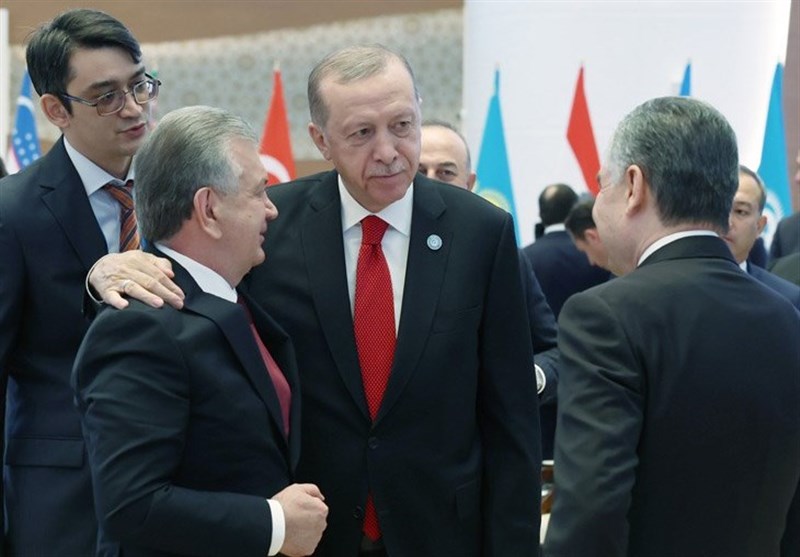Seyed Ali Ghaem Maghami, speaking in an interview with the website of the Strategic Council on Foreign Relations, pointed to the meeting of the “Organization of Turkic States” in Uzbekistan and stated: This organization includes about 180 million people, while Hungary has also become an observer member of the meeting. In the recent meeting, Northern Cyprus was added to the observer members of the organization. Also, based on the evaluations of experts; the Turkic world is a market with a population of 300 million people, a national income of 1.5 trillion dollars, a trade volume of more than 500 billion dollars and an investment volume of 250 billion dollars, and has an important capacity and the power of economic growth and development.
The analyst of international affairs, while explaining the “Vision 2040 of the Turkic World”, which includes the medium and long-term goals and plans of the organization, said: Turkey has announced that it will give scholarships to all Central Asian countries, it has opened universities in those countries in the past years and now also announces the opening of another university in Uzbekistan.
He continued: Turkey and the Central Asian countries are mutually seeking entanglement and expansion of relations, and this measure has been assessed as Ankara’s entry into Russia’s backyard. In the past, we have been witness to more attention and efforts of the Zionist regime to influence and make investment in the Azerbaijan, Kazakhstan, Turkmenistan, and Uzbekistan republics.
Referring to the assessment of the media close to the Chinese government, which assessed this non-Russian mechanism as a threat to China as well as a threat to regional stability, Ghaem Maghami added: Because of the presence of the Uyghurs, China is sensitive to the ideologies of pan-Turkism and Islamism of Ankara and believes that the organization can intensify the ethnic tensions in the “ Xinjiang” region and challenge the stability and security of the region, because the spread of the idea of extreme Turkish nationalism entails the risk of creating instability.
This international affairs expert emphasized: Chinese media had announced that the organization would increase competition and tension between Russia and Turkey, and under this situation, the announcement of the Turkish Republic of Northern Cyprus joining that organization has increased China’s sensitivity; however, we were not witness to any serious criticism from those countries.
Saying that Russia is also trying not to confront the organization, he explained: Earlier, the Kremlin spokesman had commented about the controversial videos in which Erdoğan held a map called the “Turkic World” in his hands which included large parts of Russia, saying ‘but the problem is that there is no big red star in the center of the Turkic World map. That star is in Russia, in Altai, that holy place. I say this as a Turkologist!”
Emphasizing the necessity of increasing the attention of member countries of the organization to economic and commercial cooperation and avoiding fueling ethnic and racial issues, he said: Some strategists believe that the organization can be a threat to the region in terms of fueling racial issues and also NATO’s exploitation of it; however, it should be kept in mind that Turkey is the only NATO member country present in that organization, therefore, by addressing only some areas that can create a threat, the importance of paying attention to the opportunities should not be neglected.
Pointing to some competitions among the member countries of the Turkish-speaking organization, including Turkey, the Republic of Azerbaijan, and Kazakhstan, regarding weaker countries being influenced by the ambitions of bigger countries, Ghaem Maghami noted: Countries member in that organization do not have the same power and influence, and Turkey is definitely has the upper hand among them and in this way expands its influence; but it seems that other countries, especially the Republic of Azerbaijan, Kazakhstan and Turkmenistan, also pursue their independent interests in that organization.
Emphasizing the importance of Iran’s attention to the expansion of relations and investment in the countries of Central Asia and the Caucasus in various fields, he added: More than 26 billion dollars of trade exchanges have been established between Turkey and the countries of Central Asia. In addition, member countries of the “Organization of Turkic States” have announced that they have more than one trillion dollars in trade relations with the international community, of which 10 percent of the volume is between the Turkic states. Of course, those countries have announced that they are trying to increase the volume of mutual trade and investment between Turkish-speaking countries.
He explained: Most of those countries are present in several regional organizations and pacts, including ECO, Organization of Islamic Cooperation, Eurasian Economic Cooperation, as well as Collective Security Treaty and bilateral and regional cooperation. Considering the membership of Central Asian countries in those organizations and the existence of common interests with them, Iran can have common interests and good cooperation with the “Organization of Turkic States”. Unfortunately, some views inside and outside are trying to define Iran in contrast to that organization by raising some issues and claims and in a way put that organization in contrast to Iran. While we have expandable and neighborly cooperation with those countries, all the capacities should be used.










0 Comments